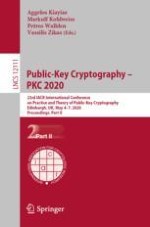2020 | OriginalPaper | Chapter
Tight and Optimal Reductions for Signatures Based on Average Trapdoor Preimage Sampleable Functions and Applications to Code-Based Signatures
Authors : André Chailloux, Thomas Debris-Alazard
Published in: Public-Key Cryptography – PKC 2020
Publisher: Springer International Publishing
Activate our intelligent search to find suitable subject content or patents.
Select sections of text to find matching patents with Artificial Intelligence. powered by
Select sections of text to find additional relevant content using AI-assisted search. powered by
